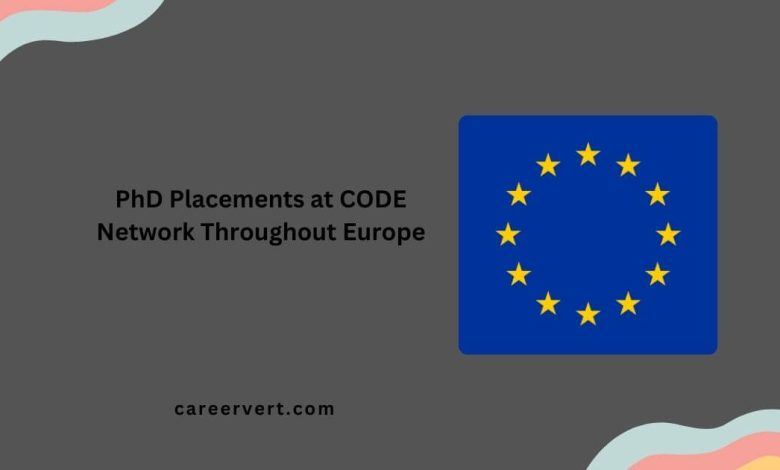PhD Placements at CODE Network Throughout Europe

Setting sail into vast intellectual waters to pursue a PhD is analogous to embarking on a journey to explore, discover, and contribute to the academic community. Today, I would like to discuss an intriguing opportunity that has emerged throughout the European landscape: the CODE Network’s provision of ten PhD placements. Whether you are a recent master’s graduate or you have been contemplating the opportunity to further explore your field, this may be the call to expedition you have been waiting for.
The CODE Network: A Snapshot:
So, let’s begin by gaining a greater understanding of the CODE Network. Imagine this: a network of universities and research institutions that are dispersed throughout Europe, each of which is brimming with academic magic, creativity, and innovation. The CODE Network is committed to promoting collaborations, challenging boundaries, and providing distinctive opportunities for both PhD candidates and researchers. Envision can access cutting-edge laboratories, mentors who provide guidance, and a diverse community of innovators and doers. Doesn’t it sound like a dream?
Check Also: Best Websites for Visa Sponsorship Jobs in Europe
Benefits of PhD Placements at CODE Network Throughout Europe:
- Access to Research Facilities of the Highest Quality: The CODE Network provides PhD candidates with access to state-of-the-art research facilities at numerous European institutions. This access encompasses technical resources, libraries, and sophisticated laboratories, which enable students to conduct research of a high caliber that may not be feasible at their home institutions.
- Opportunities for Collaborative Research: The CODE Network fosters collaboration among research institutes, industries, and universities. PhD students can collaborate with prominent experts in their respective fields from various countries through cross-institutional research projects. This improves their academic work and introduces new methodologies, perspectives, and innovations.
- Multidisciplinary Methodology: The network promotes multidisciplinary research by providing PhD candidates with the opportunity to collaborate on projects that encompass a variety of academic disciplines. This broadens the scope of their research, thereby increasing its adaptability to real-world issues and facilitating the development of additional career paths in academia, industry, and policy-making.
- Cultural Experience and International Exposure: The CODE Network provides PhD placements that allow students to reside and perform in a variety of European countries. This international experience broadens cultural comprehension and improves language abilities, both of which are valuable assets in a world that is becoming more globalized. Students are also exposed to new research cultures and practices by working in diverse academic environments.
- Establishing a Professional Network: The extensive academic and professional networks that CODE provides are advantageous to PhD candidates. Students have the opportunity to establish connections with academicians, industry experts, and fellow PhD students from various European countries. This network has the potential to facilitate future academic partnerships, employment opportunities, and collaborations.
- Exposure to Diverse Research Cultures: The research traditions, funding mechanisms, and academic approaches of European countries are diverse. PhD students can become more adaptable and versatile as researchers by acquiring the ability to navigate a variety of academic systems by engaging with these distinctions. This also improves their ability to collaborate on international initiatives in the future.
- Access to Specialized Training Programs
Specialized training programs, workshops, and seminars are provided by numerous institutions within the CODE Network. These programs are intended to improve specific research abilities, including sophisticated data analysis techniques, laboratory methodologies, and project management. This training provides PhD candidates with practical tools that they can implement in their professional and research careers. - Mobility in the Field of Interdisciplinary: One of the fundamental principles of the CODE Network is to encourage the mobility of PhD students. Candidates frequently have the chance to divide their time between multiple institutions, thereby leveraging the resources and expertise of each. This mobility can also result in access to a variety of laboratories or field sites throughout Europe, which improves the quality and breadth of research.
- Financial Assistance and Funding: Scholarships, stipends, or research funding are frequently provided to PhD candidates by CODE Network institutions. These financial assistance options facilitate students’ concentration on their academic pursuits without the impediment of financial constraints. Travel allowances and accommodation assistance are even included in certain placements.
- Opportunities for Professional Development: The CODE Network prioritizes the preparation of PhD candidates for a variety of career trajectories. Numerous institutions maintain robust relationships with governmental bodies, NGOs, and industries. This increases the employability of graduates in both academic and non-academic settings by providing opportunities for internships, consultancy projects, or industry-sponsored research.
- Collaborations between academia and industry: PhD students are able to collaborate on initiatives that have practical applications as a result of the network’s connections with industries throughout Europe. In sectors such as technology, healthcare, engineering, and environmental science, industry collaborations frequently lead to innovations and advancements that are immediately beneficial. This presents a distinctive opportunity for students to transform their research into practical solutions and make a significant impact beyond the confines of academia.
- Increased Employability: The CODE Network’s PhD placement program not only improves a student’s academic credentials but also increases their competitiveness in the global job market. Students are equipped for careers in academia, international organizations, research institutes, and private industry through their international experience, exposure to diverse academic and professional environments, and participation in collaborative research projects.
- Access to European Research Funding: Frequently, students are granted access to EU research grants and funding opportunities, such as the Horizon Europe program, by being a member of a European research network like CODE. The completion of research initiatives and the expansion of the scope of doctoral work can be contingent upon the availability of these funds.
- Opportunities for Publication and Dissemination: Students in the CODE Network are frequently encouraged to present their research at international conferences and publish it in high-impact journals. The network’s reputation and connections can assist PhD candidates in enhancing their academic profiles and career prospects by increasing their visibility in their respective disciplines.
- Contribution to the Resolution of Global Challenges: The CODE Network’s international and interdisciplinary nature frequently corresponds with the resolution of global challenges, including health crises, climate change, sustainable development, and technological advancement. PhD students are intellectually and ethically highly rewarded for their research contributions that has a global impact.
List of 10 CODE Network PhD Scholarships in 2024:
- Janneke Jehee (Donders Institute)— Investigating the neural and computational components of sensory unpredictability and choice confidence. Jehee Lab
- Uta Noppeney (Donders Institute)— Exploring the computational and neural systems that underlie metacognition and decision self-confidence. Mindful of Multiple Senses
- Pascal Mamassian (École Normale Supérieure)—Investigating sensory and self-confidence uncertainty through probabilistic designs. LSP
- Kobe Desender (KU Leuven)—Specializing in the computational modeling of the relationships between choice self-confidence and mind activity. Desender Laboratory
- Steve Fleming (College College London) is investigating the neural and computational underpinnings of metacognition and self-assurance. MetaCog Laboratory
- David Soto (Basque Center on Cognition, Brain, and Language) is conducting developmental research on decision self-confidence. Soto Laboratory
- Ruth van Holst (Amsterdam University Medical Centers) is researching decision confidence in behavioral issues. Van Holst Laboratory
- Elisa Filevich (University of Tübingen): Investigating the adaptability of metacognition and confidence. MetaMotor Lab
- Andrea Desantis (The French Aerospace Laboratory– ONERA)– Unraveling the neural underpinnings of perceptual self-assurance. Desantis Net
CODE strongly encourages applications from females and underrepresented teams and provides additional support to scientists with family members. All of the Marie Curie Activities PhD placements mentioned above are also available for prospective candidates to review below.
Concluding Thoughts: Your Next Big Leap
Beginning a PhD at one of the CODE Network’s placements in Europe is not merely a continuation of your academic voyage; it is an opportunity to develop, challenge oneself, and make a positive impact. It is about contributing to a global community of change-makers, innovators, and intellectuals by being a part of something greater than oneself.
Given that you are perched on the edge of a cliff, contemplating whether or not to take the plunge, what is my recommendation? Spread your wings and plunge in. These opportunities are not frequently encountered, and who knows—it may be the adventure you have been seeking.
Therefore, what are you anticipating? Investigate the placements, heed to your intuition, and perhaps, in the future, I will be apprised of your innovative research. New beginnings and the boundless opportunities that lie ahead are celebrated!
Frequently Asked Questions:
-
What is the easiest European country to get PhD admission?
Germany and Sweden are recognized for their relatively straightforward PhD-Admissions-Prozesses, which are frequently conducted in English. However, it is important to take into account the specific requirements of the university, as well as the individual’s academic background, research interests, and language proficiency.
-
What is the requirement for PhD in Europe?
Before applying for a Ph.D. program in the majority of European countries, it is necessary, to have the Suitability of your foreign Bachelor- and Master-Degrees evaluated by a national organization. It may be necessary for you to submit your degree certificates, as well as a record of your module marks and information about the Course structure.
-
Is it worth doing PhD in Europe?
In conclusion, pursuing a PhD in Europe can offer a high-quality education, cultural enrichment, financial support, networking opportunities, and improved career prospects.



